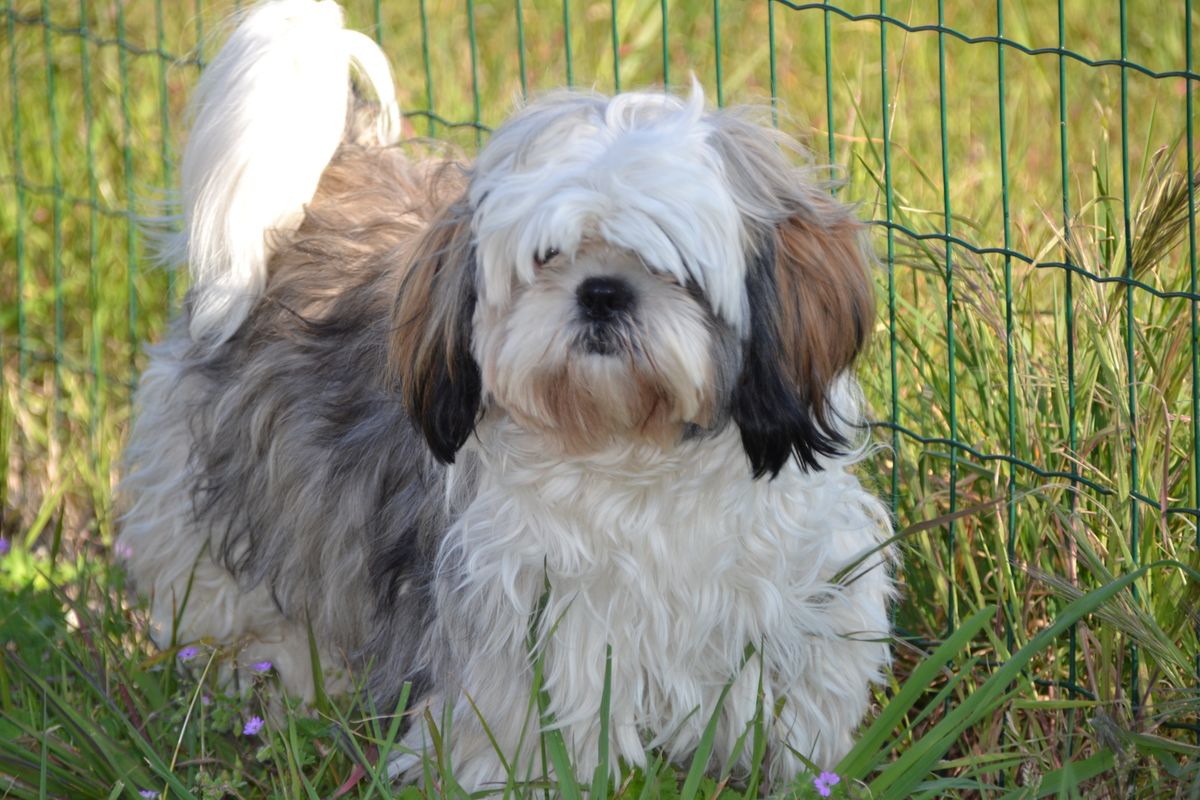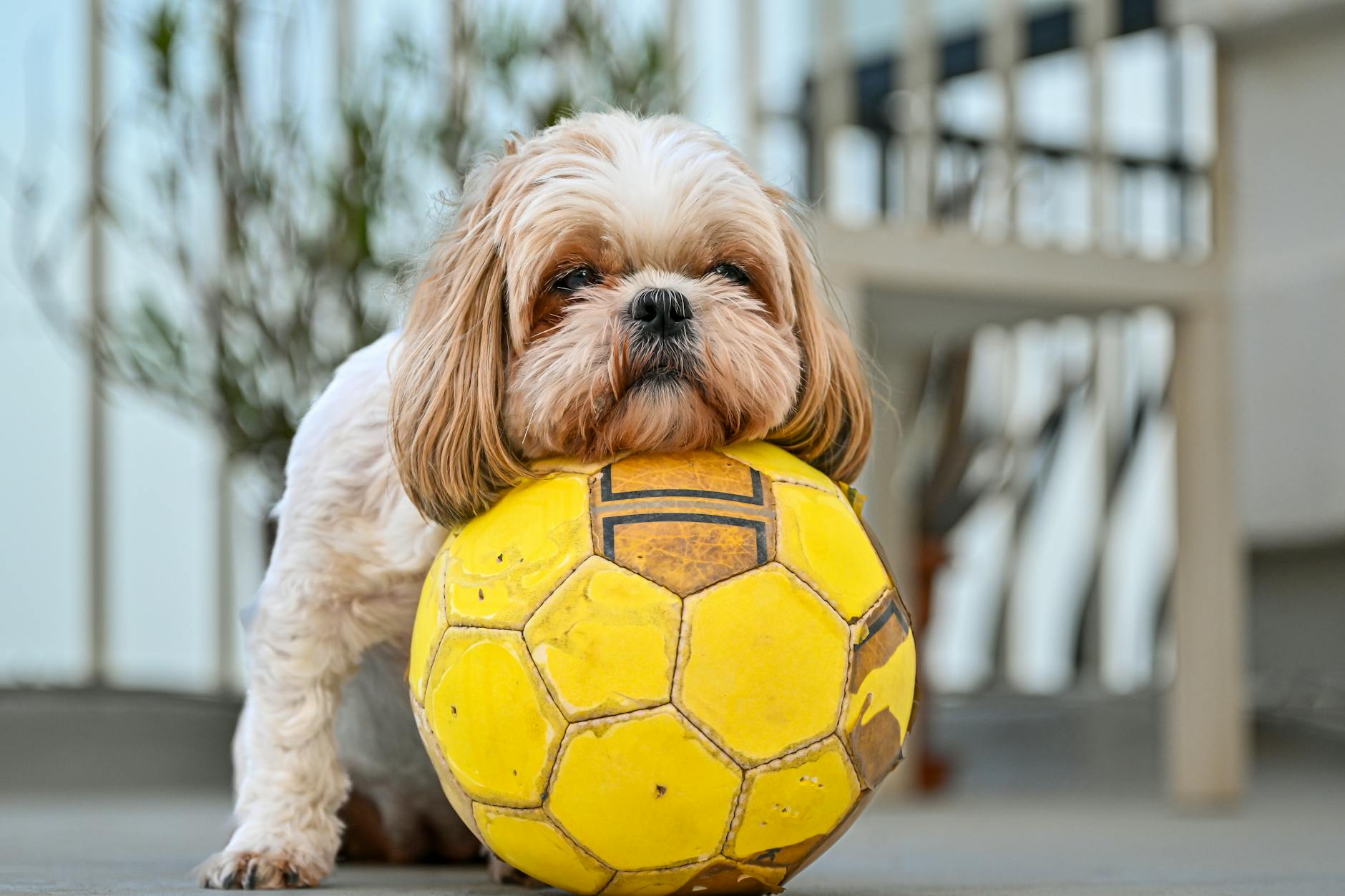The Shih Tzu, a breed with a regal lineage and a lively temperament, is often seen as a companion rather than a protector. However, with the right training and care, Shih Tzus can develop protective instincts that make them more than just adorable pets. This article explores the potential of Shih Tzus as guard dogs, offering insights into their suitability for different households and the nurturing of their innate protective traits.
Key Takeaways
- Shih Tzus have a royal heritage and are known for being sociable, lively, and well-behaved, making them suitable for various household types.
- Despite their small size, Shih Tzus can be trained for protective roles through tailored training techniques and consistent socialization.
- Regular health checks and a balanced diet are crucial for maintaining a Shih Tzu’s health, enabling them to be vigilant and effective in protective roles.
- Real-life anecdotes demonstrate that Shih Tzus can serve as alert dogs, deterring unwanted visitors and forming strong emotional bonds with their owners.
- Understanding and nurturing the Shih Tzu’s temperament and health needs are key to unlocking their potential as guard dogs for singles, seniors, and families alike.
Understanding the Shih Tzu Breed

Historical Significance and Royalty Connection
The Shih Tzu breed boasts a regal history, deeply intertwined with Chinese royalty. These dogs were cherished companions of emperors and nobles, often regarded as a symbol of wealth and luxury. Their presence in the royal courts was not merely ornamental; Shih Tzus served as both lap warmers and watchdogs, alerting their owners to the presence of strangers with their distinctive bark.
Despite their small size, Shih Tzus carry a legacy of guardianship that dates back centuries. It’s important to recognize that while they may not have the imposing presence of traditional guard dogs, their alertness and loyalty were highly valued in historical settings. This intrinsic vigilance can be nurtured even today, making them suitable for protective roles in modern households.
The Shih Tzu’s historical role as a guardian within the royal courts underscores their potential as protective companions in contemporary settings.
Physical Characteristics and Health Considerations
Shih Tzus are known for their distinctive appearance and compact size, which make them ideal for companionship and even for protective roles in certain contexts. Their long, flowing coats and sweet, expressive faces often endear them to their owners. However, their physical characteristics also come with specific health considerations that owners should be aware of.
- Weight: Typically ranges from 9 to 16 pounds
- Height: Generally about 9 to 10.5 inches at the shoulder
- Life Expectancy: On average, 10 to 16 years
Proper care for a Shih Tzu involves regular grooming to maintain their coat and prevent skin issues. Their diet should be monitored to avoid obesity, which is a common concern for smaller breeds. Regular veterinary check-ups are crucial to address any health issues promptly.
Creating a safe and comfortable environment for a Shih Tzu is essential. This includes providing appropriate nutrition, ensuring a clean living space, and offering regular exercise and mental stimulation to support their overall well-being.
Owners should also be mindful of dental health, as small breeds can be prone to dental problems. With the right care and attention, Shih Tzus can lead a healthy, fulfilling life as both a beloved pet and a vigilant companion.
Temperament and Sociability
The Shih Tzu is a breed that exudes a sociable and lively temperament, making them well-suited for various household environments. Their innate alertness and devotion to their family members often translate into a protective demeanor, despite their small size and generally non-aggressive nature.
- Sociable: Shih Tzus enjoy the company of their human companions and can be quite affectionate.
- Lively: They exhibit a playful energy that endears them to many.
- Devoted: A strong bond with their owners is typical for Shih Tzus, often leading to a protective instinct.
While not bred as guard dogs, Shih Tzus can develop a sense of protectiveness and alert their owners to unusual activities or the presence of strangers. Their size may not be intimidating, but their alertness can serve as an early warning system in a household.
It’s important to recognize that while Shih Tzus can be protective, they are also known for their friendly disposition towards other animals and people when properly socialized. This balance of traits makes them adaptable to different living situations, from single-person homes to larger family settings.
Training Your Shih Tzu for Protective Roles

Assessing Your Shih Tzu’s Guarding Potential
While Shih Tzus are not typically recognized as traditional guard dogs, they can possess a certain level of protective instinct that may be nurtured. Assessing your Shih Tzu’s guarding potential involves observing their behavior in various situations.
- Monitor their reactions to unfamiliar sounds or people.
- Note their alertness and willingness to investigate disturbances.
- Consider their level of attachment and protectiveness towards family members.
It’s important to remember that a Shih Tzu’s size and temperament naturally limit their ability to confront threats. However, their alertness can make them excellent watchdogs, signaling the presence of strangers.
Training should be approached with realistic expectations, focusing on enhancing their natural tendencies to alert and alarm rather than physical confrontation. With patience and consistent training, a Shih Tzu can become more attentive to their surroundings and act as a first line of alert to potential dangers.
Basic Training Techniques for Protective Behavior
Training a Shih Tzu to adopt protective behaviors involves a balance of firmness and positive reinforcement. Start with basic obedience commands such as ‘sit’, ‘stay’, ‘come’, and ‘leave it’. These foundational skills are crucial for any dog assuming a protective role, as they must be able to follow your instructions precisely.
- Introduce your Shih Tzu to a variety of environments and situations to gauge their natural alertness.
- Use role-playing scenarios to teach them to bark or alert you when a stranger approaches.
- Reward your Shih Tzu for displaying desired protective behaviors, reinforcing their training.
Consistency is key in training. Regular, short training sessions are more effective than infrequent, long ones. This keeps your Shih Tzu engaged and prevents them from becoming overwhelmed or bored.
Remember, while Shih Tzus can be trained for protective behavior, their small size and friendly nature generally do not make them ideal guard dogs. Their training should focus on alerting rather than confronting potential threats.
Socialization and Its Impact on Guarding Instincts
The process of socialization is crucial in shaping the protective instincts of a Shih Tzu. Proper socialization ensures that the dog can distinguish between normal and threatening situations. It involves exposing the Shih Tzu to a variety of environments, people, and other animals from an early age to foster appropriate responses to different stimuli.
- Early socialization helps prevent fearfulness and aggression.
- Positive experiences with strangers can teach discernment between friends and potential threats.
- Introducing a Shih Tzu to other pets can reduce territorial behavior and promote harmony.
Socialization does not diminish a Shih Tzu’s natural alertness but rather channels it into protective behavior that is controlled and predictable.
Without adequate socialization, a Shih Tzu may become overly timid or aggressive, which can undermine its effectiveness as a guard dog. It’s important to balance social experiences with training to nurture a Shih Tzu’s guarding instincts while ensuring they remain a well-adjusted member of the family.
The Shih Tzu’s Compatibility with Different Households

Suitability for Singles, Seniors, and Urban Dwellers
The Shih Tzu’s small size and adaptable nature make it an ideal companion for those living in apartments or smaller homes. Their calm demeanor and lower exercise needs align well with the lifestyles of singles, seniors, and urban dwellers.
Despite their royal lineage, Shih Tzus do not demand palatial spaces to thrive. They are content with the affection and care of their owners, regardless of the living space size. This makes them particularly suitable for individuals who may have mobility issues or limited space.
Shih Tzus are sociable and lively, fitting seamlessly into the daily routines of their owners. Their beautiful coats do require regular grooming, which can be a soothing activity for both the pet and owner.
While they are not hypoallergenic, their grooming needs can help manage shedding, making them a considerable option for those with mild allergies. Here’s a quick overview of their suitability:
- Alert and devoted temperament
- Suitable for singles, seniors, and urban living
- Manageable exercise requirements
- Regular grooming needed
- Not hypoallergenic, but manageable for some allergy sufferers
Integrating a Shih Tzu into a Family Setting
Integrating a Shih Tzu into a family environment can be a delightful experience, given their affectionate and sociable nature. These dogs are known for their love of companionship, making them excellent pets for households with children and other family members. However, it is crucial to establish clear boundaries and rules for both the dog and the family to ensure a harmonious living situation.
- Positive Reinforcement: Encourage good behavior in both your Shih Tzu and the children by using positive reinforcement techniques.
- Routine: Establish a consistent routine for feeding, walks, and playtime to help your Shih Tzu feel secure and integrated.
- Personal Space: Ensure your Shih Tzu has a quiet space of their own to retreat to when they need a break from family activities.
While Shih Tzus are generally healthy, they may encounter age-related issues such as eye problems. Regular health checks are important to maintain their well-being in a family setting.
Remember, every Shih Tzu has a unique personality, and some may require more time to adjust to a new family environment. Patience and understanding from all family members will go a long way in nurturing a loving relationship with your protective companion.
Considerations for Homes with Other Pets
Introducing a Shih Tzu into a household with other pets requires careful consideration to ensure harmony and safety for all animals involved. Shih Tzus are generally amiable and can coexist peacefully with other pets, but their small size and sometimes assertive demeanor may pose challenges in multi-pet homes.
- Establish clear boundaries and safe spaces for each pet to avoid territorial disputes.
- Gradual introductions are key to fostering positive relationships between pets.
- Monitor interactions closely, especially in the initial stages, to prevent any aggressive behavior.
It is essential to understand the individual personalities and needs of your pets to create a balanced environment. Consistent training and reinforcement of positive behavior will aid in developing a cohesive pet family.
Remember that each pet’s health and wellness should be a priority. Regular health checks, proper nutrition, and adequate exercise are vital for maintaining a peaceful and healthy multi-pet household.
Health and Wellness for Your Guarding Shih Tzu

Routine Health Checks and Common Issues
Ensuring the health and longevity of your Shih Tzu, especially when training for a protective role, requires regular veterinary care. Routine check-ups are crucial for early detection and treatment of common health issues that may affect your Shih Tzu’s ability to perform its duties.
A tailored diet and appropriate exercise are fundamental to maintaining your Shih Tzu’s health. Here is a list of key considerations for your Shih Tzu’s wellness routine:
- Regular veterinary check-ups to monitor health and catch issues early
- A balanced diet to support overall well-being
- Low-impact exercises suited to their size and energy levels
- Mental stimulation to keep them alert and engaged
Consistency in care and personalized attention are vital in promoting health and vitality, especially in aging dogs.
Remember, a healthy Shih Tzu is more capable of being an effective guardian. Addressing their health needs and common concerns such as dental hygiene, allergy management, and mobility support will ensure they remain vigilant and ready to protect.
Diet and Exercise for Optimal Vigilance
A well-balanced diet is crucial for maintaining the health and alertness of a Shih Tzu, especially when trained for protective roles. Proper nutrition supports energy levels and cognitive function, ensuring your Shih Tzu is always ready to respond to potential threats. Incorporating ingredients such as kale, blueberries, chia seeds, and pumpkin can provide active ingredients beneficial for your dog’s vigilance.
Regular exercise is equally important for a Shih Tzu’s physical and mental health. It not only keeps them fit but also sharpens their instincts. A combination of daily walks, playtime, and training exercises will help keep your Shih Tzu alert and responsive.
While the right diet fuels their body, consistent exercise routines condition their mind and body to be more perceptive and reactive to their surroundings.
Remember, each Shih Tzu is unique, and their dietary and exercise needs may vary. Consulting with a veterinarian can help tailor a plan that’s best for your dog’s individual needs.
Mental Stimulation and Its Role in a Protective Shih Tzu
Mental stimulation is as crucial for a Shih Tzu as physical exercise. Engaging a Shih Tzu in various activities not only keeps their mind sharp but also enhances their protective instincts. Regular mental challenges can prevent boredom and associated behavioral issues, making them more attentive and responsive guardians.
Mental stimulation through varied activities improves behavior and overall quality of life.
While physical exercise benefits cardiovascular health and general well-being, mental exercises are key to maintaining a vigilant and protective demeanor. Activities such as puzzle toys, obedience training, and interactive games can provide the necessary mental workout for your Shih Tzu.
- Puzzle toys that challenge their problem-solving skills
- Obedience training sessions that reinforce commands
- Interactive games that promote alertness and engagement
Prioritize safety in dog exercise and ensure that the activities are suitable for your Shih Tzu’s age and health condition. A well-stimulated Shih Tzu is not only a happier pet but also a more effective protector of the home.
Real-Life Stories of ShihTzus in Protective Roles

Anecdotes of Shih Tzus Alerting Owners
Shih Tzus may not be the first breed that comes to mind when considering guard dogs, but their alert and lively temperament makes them excellent watchdogs. Owners have shared numerous stories where these small but attentive dogs have played a crucial role in alerting them to unusual activities or the presence of strangers.
- A Shih Tzu named Bella detected a gas leak that went unnoticed by her sleeping family, barking persistently until they awoke and evacuated the house.
- Another Shih Tzu, Max, consistently barked to alert his owner of a person lurking around the backyard late at night.
While they may not intimidate intruders with their size, their keen senses and devotion to their family can make them surprisingly effective in protective roles.
These anecdotes highlight the breed’s natural propensity for vigilance and the strong bond they share with their owners, making them more than just lap dogs. They are companions that can provide an additional layer of security through their innate alertness.
Shih Tzus Deterrent Effect on Unwanted Visitors
While Shih Tzus may not be the first breed that comes to mind when considering a guard dog, their alertness and loyalty can make them surprisingly effective at deterring unwanted visitors. Their presence alone can be enough to discourage potential intruders who are often looking for the path of least resistance.
Despite their small size, Shih Tzus possess a distinct bark that serves as an immediate signal of disturbance, alerting their owners and potentially scaring off trespassers. This natural vigilance is a valuable trait for homeowners seeking an additional layer of security.
Shih Tzus, with their keen senses and attentive nature, can provide a sense of safety and act as a first line of defense in a household.
Owners have noted that the breed’s tendency to bark at unfamiliar sounds or movements makes them suitable for keeping watch over the home. While they may not physically overpower an intruder, their alert behavior is a noteworthy contribution to home security.
The Emotional Bond Between Protective Shih Tzus and Their Owners
The relationship between a Shih Tzu and its owner is a tapestry woven with threads of loyalty and affection. Shih Tzus are known for their devoted nature, often forming an unbreakable bond with their human companions. This bond is not only emotional but also manifests in the dog’s protective behavior, which is rooted in their territorial instincts and their loyalty.
Owners of protective Shih Tzus report a heightened sense of security and companionship. The dogs’ alertness to unfamiliar sounds and movements can provide a comforting presence, especially for singles, seniors, and urban dwellers who may appreciate the extra vigilance.
The protective instincts of a Shih Tzu, combined with their affectionate demeanor, create a unique guardian that is both a loving pet and a watchful protector.
While not all Shih Tzus will display guarding tendencies, those that do often develop a special connection with their owners, becoming more attuned to their emotions and behaviors. This mutual understanding enhances the protective nature of the Shih Tzu, making them more effective in their role as a guardian.
Conclusion
In conclusion, while Shih Tzus may not be the first breed that comes to mind when considering guard dogs, their alert and devoted nature can be nurtured to develop protective instincts suitable for singles, seniors, and urban dwellers. Despite their small stature and sociable demeanor, with proper training and socialization, Shih Tzus can become watchful companions, offering a comforting presence to their owners. It’s important to remember that while they can serve as a deterrent, they should not be solely relied upon for home security. Ultimately, the Shih Tzu’s role as a guard dog should complement their primary role as a loving and cherished member of the family.
Frequently Asked Questions
Are Shih Tzus suitable guard dogs given their small size and friendly nature?
While Shih Tzus are not typically known for their guarding abilities due to their small size and sociable temperament, they can be trained to be more alert and protective of their home environment. Their devotion to their owners and alertness can make them good watchdogs.
What kind of training is necessary for a Shih Tzu to develop protective behaviors?
Training a Shih Tzu for protective roles involves basic obedience training, socialization, and specific exercises to enhance their alertness and response to potential threats. Consistency and positive reinforcement are key components of this training.
How does a Shih Tzu’s temperament affect its ability to guard?
A Shih Tzu’s lively and devoted temperament makes them attentive to their surroundings and their owners. With proper training, these traits can be channeled into protective behaviors, although they may not be as intimidating as larger guard dog breeds.
Can Shih Tzus adapt well to living with families and other pets?
Yes, Shih Tzus are known for their sociability and can integrate well into family settings, including those with children and other pets. They are affectionate and enjoy companionship, making them great family dogs.
What are the common health issues to look out for in a Shih Tzu, especially one in a protective role?
Shih Tzus may face health issues related to their eyes, teeth, and heart. It is important for a Shih Tzu in a protective role to have regular health checks and maintain a healthy diet and exercise routine to prevent these problems.
Are there any real-life instances where Shih Tzus have successfully acted in a protective role?
There are anecdotes of Shih Tzus alerting their owners to potential dangers and acting as deterrents to unwanted visitors. While they may not physically confront a threat, their alertness can provide an early warning to their owners.




